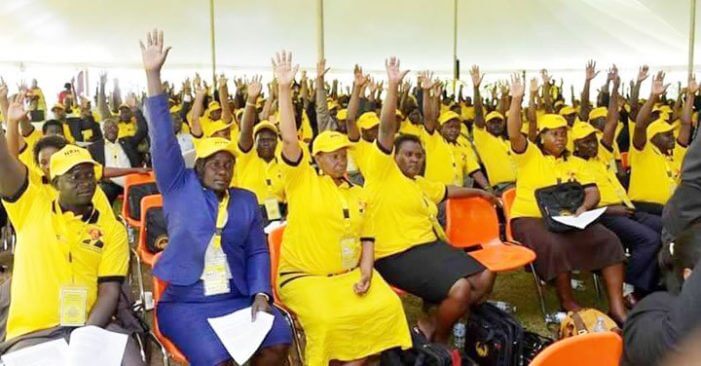The ruling NRM Parliamentary Caucus will hold a special meeting on Friday, February 21, 2025, at 11:00 AM at State House, Entebbe, to discuss key legislative matters, according to an official notice from the Government Chief Whip, Hon. Obua Denis Hamson (MP).
The meeting will focus on two critical agenda items: Proposed Amendments to the UPDF Act and Budget Priorities for the 2025/2026 Financial Year.
In preparation for the session, all caucus members are required to undergo a mandatory COVID-19 test at Parliamentary Conference Hall B from Wednesday, February 19, to Thursday, February 20, 2025, between 9:00 AM and 5:00 PM.
The government Chief Whip Hamson Obua says the communication has also been copied to key government leaders, including President Yowri Museveni, Vice President, Prime Minister, and NRM Secretary General.
The NRM Caucus meetings play a crucial role in shaping government policy and legislative priorities before they are presented on the floor of Parliament. This upcoming session is expected to be a significant step in defining Uganda’s budgetary direction for the coming financial year.
On 31 January 2025, the Supreme Court delivered a judgement nullifying with immediate effect, prosecution of all civilians in the General Court Martial and military courts as unconstitutional.
In this constitutional appeal, the Supreme Court of Uganda declared sections of the Uganda Peoples’ Defence Act (UPDF Act) that provide for the blanket trial of civilians in military courts unconstitutional, ordered for all ongoing or pending criminal trials against civilians before the court martial to immediately cease and be transferred to the ordinary courts of law with competent jurisdiction, among other orders.
Chief Justice Owiny-Dollo affirmed that the Summary Trial Authority (STA) and the Unit Disciplinary Committee (UDC) are lawfully established under Sections 191 & 192 (now Sections 189 & 190), and Section 195 (now Section 193) of the UPDF Act as military tribunals. However, their jurisdiction is strictly confined to military discipline.
“The existence of military tribunals is not in question. What is unconstitutional is their assumption of judicial power over civilians,” he ruled.
The Chief Justice upheld that the General Court Martial (GCM), created under Section 197 (now Section 195) of the UPDF Act, is a subordinate court with specialized jurisdiction. However, he clarified:
“The General Court Martial remains a lawful court but must restrict itself to matters of military discipline. Its jurisdiction does not extend to civilians.”
The Supreme Court struck down Sections 179(1) & (2) (now Sections 177(1) & (2)) of the UPDF Act, which granted military courts the power to try capital offenses.
“Granting subordinate military courts jurisdiction over capital offenses contravenes Articles 129(1)(d) and 126(1) of the Constitution,” the Chief Justice ruled.
The Supreme Court ruled that Sections 191(3)(a) (now Section 189(3)(a)), and Sections 195(3) & (4) (now 193(3) & (4)), which allowed military tribunals to order detention and imprisonment, were unconstitutional.
“The power of detention and imprisonment is a judicial function reserved for courts of law under Articles 23, 126(1), and 129(1)(d) of the Constitution. Military tribunals cannot exercise these powers over civilians,” Owiny-Dollo stated.
The court found that the UPDF Act does not contain adequate constitutional safeguards to ensure the independence and impartiality of military courts.
“The trial procedure in the General Court Martial, the Division Court Martial, and the Court Martial Appeal Court lacks the constitutional guarantees necessary for fair hearings,” ruled the Chief Justice, citing Articles 21, 28(1), 44(c), and 128(1) of the Constitution.
The Supreme Court ruled that Section 119(1)(g) (now Section 117(1)(g)) of the UPDF Act, which was used to prosecute civilians, violates constitutional rights.
“This provision, which allows civilians to be tried by military courts for aiding or abetting military offenses, contravenes Articles 28(1), 44(c), and 21 of the Constitution,” Owiny-Dollo declared.
He further struck down Section 119(1)(h) (now Section 117(1)(h)), which granted blanket jurisdiction to military courts over civilians.
“The broad jurisdiction conferred by these sections is unconstitutional. The prosecution of civilians falls under the mandate of civilian courts,” he ruled.




